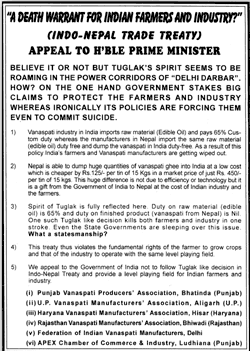 India is sticking to its contention that Nepal's exports of vanaspati ghiu, acrylic fibre, zinc oxide, copper wire, etc have seen an "unnatural surge" since the 1996 treaty, which is going to expire in a few weeks. India has already stuck an "anti-dumping duty" on zinc oxide and other Nepali exports. To be sure, some of India's concerns about the manufacture of these items and the impact of the process on employment are legitimate. But will the problems of Indo-Nepal trade treaty be resolved just by addressing the issue of these controversial items?
India is sticking to its contention that Nepal's exports of vanaspati ghiu, acrylic fibre, zinc oxide, copper wire, etc have seen an "unnatural surge" since the 1996 treaty, which is going to expire in a few weeks. India has already stuck an "anti-dumping duty" on zinc oxide and other Nepali exports. To be sure, some of India's concerns about the manufacture of these items and the impact of the process on employment are legitimate. But will the problems of Indo-Nepal trade treaty be resolved just by addressing the issue of these controversial items? The Indian anti-dumping tariffs have not just been slapped on zinc oxide, the export of Nepali steel rods to India is also being stopped because they don't have the Indian standards seal. Non-tariff barriers such as quarantine rules are being enforced on traditional Nepali agricultural exports. The export to India of Nepali Ilam tea is being obstructed.
What's more, even the export of toothpaste manufactured in Nepal by Indian multinationals has been stopped because of the retroactive imposition of Indian taxes. What is clear is that the real reason for the breakdown of trade relations between India and Nepal is not entirely the 1996 treaty.
The ruling BJP in India has always been critical of the treaty. For the last three years, the Indian government has been angered by two things: what it sees as a treaty harmful to Indian economic interests, and its perception that Nepal is allowing Pakistani intelligence (ISI) to operate in Nepal.
Clearly, that there are political reasons why our economic and trade relations with India are never on an even keel. It could be that the reason for the difficulty in suppressing the Maoist insurgency is also this iciness in political relations.
Nepal must therefore tackle the political roots of the crisis in renewing the trade treaty with India. We suffer more than India when bilateral relations take a knock, so it is in our own pragmatic interest to be proactive in this. We need know: what does India want from us? If their concerns and demands are legitimate, His Majesty's Government must address them, if they're not, it should inform the people that they're not. But just sitting around twiddling our thumbs is not going to get us anywhere. It's the politics, stupid.


